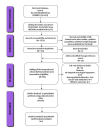Exacerbation of Pre-existing Neurological Symptoms With COVID-19 in Patients With Chronic Neurological Diseases: An Updated Systematic Review
- PMID: 36277564
- PMCID: PMC9578565
- DOI: 10.7759/cureus.29297
Exacerbation of Pre-existing Neurological Symptoms With COVID-19 in Patients With Chronic Neurological Diseases: An Updated Systematic Review
Abstract
The neurotropism of the severe acute respiratory syndrome coronavirus 2 (SARS-CoV-2) can potentially explain the worsening of symptoms in patients with a history of neurological conditions such as stroke, Parkinson's disease, Alzheimer's, and epilepsy. Several studies have reported that these pre-existing conditions may worsen with a higher frequency of flare-ups, thus resulting in a more significant risk of patient mortality. In this review, we sought to provide an overview of the relationship between pre-existing neurological disorders and COVID-19, focusing on whether the initial infection directly influenced the severity of symptoms. We systematically searched the electronic database PubMed (MEDLINE) and used specific keywords related to our aims from January 2020 to July 2022. All articles published on COVID-19 with keywords pertaining to pre-existing neurological diseases were retrieved and subsequently analyzed. After independent review, the data from 107 articles were selected and evaluated. After analyzing the data from selected articles reviewing the effect of COVID-19 on neurological conditions, we have documented the relationship between said pre-existing neurological diseases, showing an increased risk of hospitalization, admission length, worsening of symptoms, and even mortality in COVID-19 patients.
Keywords: alzheimer's disease; covid-19; epilepsy; parkinson's disease; pre-existing neurological disorders; stroke.
Copyright © 2022, Sakibuzzaman et al.
Conflict of interest statement
The authors have declared that no competing interests exist.
Figures
Similar articles
-
Pre-existing neurological conditions and COVID-19 co-infection: Data from systematic reviews, meta-analyses, and scoping reviews.J Neurol Sci. 2023 Dec 15;455:120858. doi: 10.1016/j.jns.2023.120858. Epub 2023 Oct 29. J Neurol Sci. 2023. PMID: 37948972 Free PMC article. Review.
-
The Influence of Coronavirus Disease-2019 (COVID-19) On Parkinson's Disease: An Updated Systematic Review.J Prim Care Community Health. 2021 Jan-Dec;12:21501327211039709. doi: 10.1177/21501327211039709. J Prim Care Community Health. 2021. PMID: 34404266 Free PMC article.
-
Exacerbation of neurological symptoms and COVID-19 severity in patients with preexisting neurological disorders and COVID-19: A systematic review.Clin Neurol Neurosurg. 2021 Jan;200:106349. doi: 10.1016/j.clineuro.2020.106349. Epub 2020 Nov 1. Clin Neurol Neurosurg. 2021. PMID: 33172719 Free PMC article.
-
COVID-19's Clinical-Pathological Evidence in Relation to Its Repercussion on the Central and Peripheral Nervous System.Adv Exp Med Biol. 2021;1353:197-215. doi: 10.1007/978-3-030-85113-2_11. Adv Exp Med Biol. 2021. PMID: 35137375 Review.
-
COVID-19 and neurodegenerative diseases.Eur Rev Med Pharmacol Sci. 2022 Jun;26(12):4535-4544. doi: 10.26355/eurrev_202206_29093. Eur Rev Med Pharmacol Sci. 2022. PMID: 35776055 Review.
Cited by
-
An Overview of Long COVID Support Services in Australia and International Clinical Guidelines, With a Proposed Care Model in a Global Context.Public Health Rev. 2023 Sep 22;44:1606084. doi: 10.3389/phrs.2023.1606084. eCollection 2023. Public Health Rev. 2023. PMID: 37811128 Free PMC article. Review.
-
Changes in Apathy, Depression, and Anxiety in Parkinson's Disease from before to during the COVID-19 Era.Brain Sci. 2023 Jan 24;13(2):199. doi: 10.3390/brainsci13020199. Brain Sci. 2023. PMID: 36831742 Free PMC article.
-
Sociodemographic Factors, Comorbidities, In-Hospital Complications, and Outcomes of Ischaemic Stroke Patients in the Context of the COVID-19 Pandemic in Lithuania: A Retrospective, Record-Based, Single-Centre Study.Cureus. 2023 Sep 19;15(9):e45553. doi: 10.7759/cureus.45553. eCollection 2023 Sep. Cureus. 2023. PMID: 37868513 Free PMC article.
-
High Frequency of Autoantibodies in COVID-19 Patients with Central Nervous System Complications: a Multicenter Observational Study.Mol Neurobiol. 2024 Oct;61(10):8414-8424. doi: 10.1007/s12035-024-04109-4. Epub 2024 Mar 20. Mol Neurobiol. 2024. PMID: 38507030
-
Myocardial Infarction With Non-obstructive Coronary Arteries (MINOCA): A Case Report and Comprehensive Discussion of Pathophysiology and Risk Factors.Cureus. 2024 Aug 18;16(8):e67144. doi: 10.7759/cureus.67144. eCollection 2024 Aug. Cureus. 2024. PMID: 39161551 Free PMC article.
References
Publication types
LinkOut - more resources
Full Text Sources
Miscellaneous


